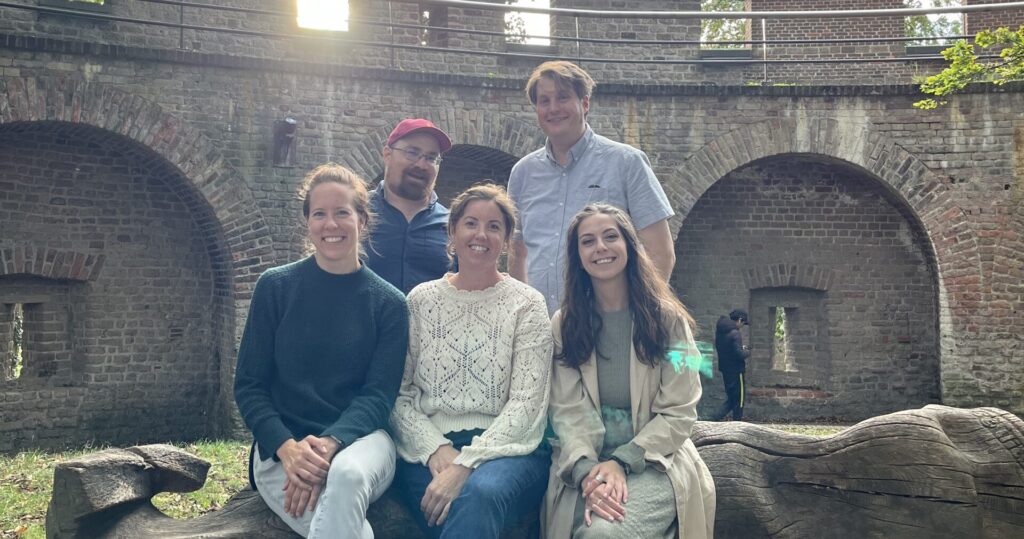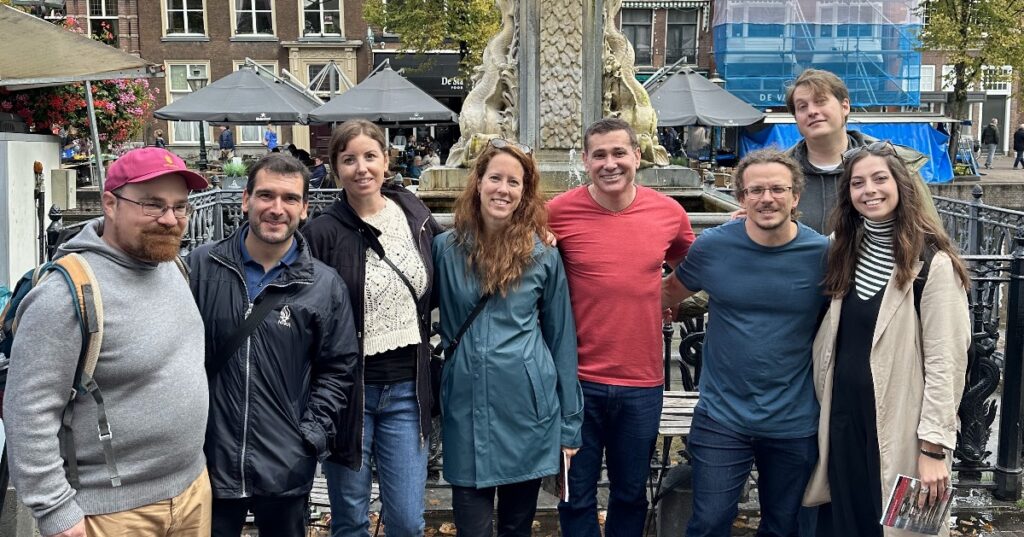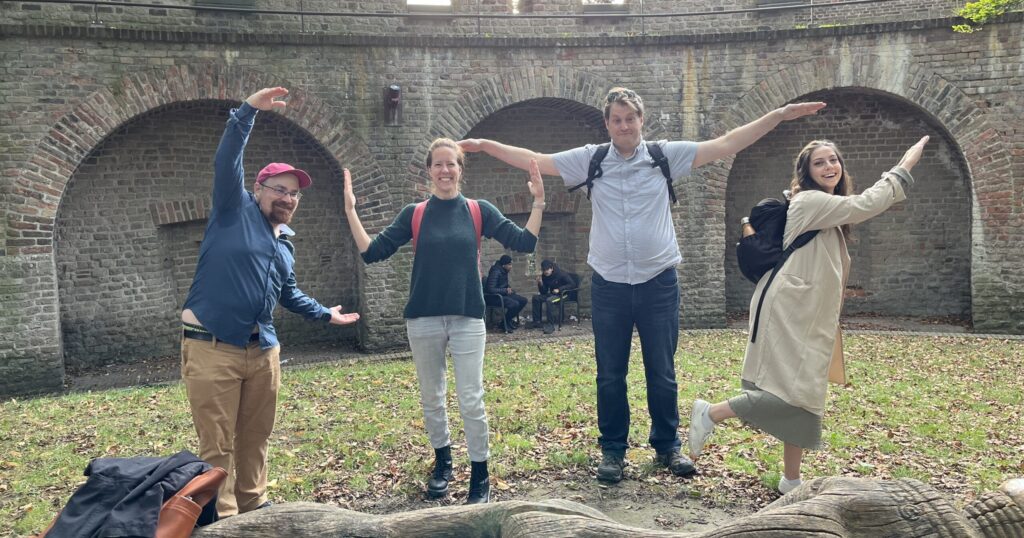The Centre for Science and Technology Studies (CWTS) hosted their fifth Scientometrics Summer School (CS3) from September 18-26, 2023 in Leiden, the Netherlands. CS3 turns theoretical ideas into hands-on research by engaging scientometrics graduate students with data, methods, and techniques used in the field. ScholCommLab members Chantal Ripp, Maddie Hare, Leigh-Ann Butler, and Rémi Toupin attended this year’s event.
In this post, Rémi, Maddie, and Leigh-Ann reflect on their time at CS3, discussing what they learned about themselves, and how their experience will impact their current and future research.

Q1: How did CS3 connect to your studies and/or research?
Rémi Toupin: My work focuses on environmental information and public attention to environmental research. Coming from science and technology studies (STS) and science communication backgrounds, I am still new to the fields of information science and scientometrics—though I believe I have solid expertise in Altmetrics.
CS3 was an opportunity for me to fortify what I knew of scholarly communication and bibliometrics, as well as learn more about the best approaches to look at traces and indicators of research in various spheres. I aim to apply this knowledge to my future work to better look at the communication of environmental knowledge in news media, policy documents, and public contexts.
Maddie Hare: My doctoral research aims to reduce the misuse of scholarly metrics through the development of educational material. Over the duration of CS3, there were valuable discussions on different cultures of research evaluation and reform across the world which now inform how I think about the (mis)use of scholarly metrics in Canada.
I particularly benefited from learning about areas of connection and exchange between scientometrics and STS—the latter of which I previously had little exposure to. The instructors presented valuable perspectives, asking how we might foster agency and dialogue to shape science (e.g., values, legitimacy, and relevance). Learning about trends in scientometrics, future trajectories of scholarly publishing, open data sources and tools, and how to produce more responsible knowledge with quantitative methods has also influenced how I’m approaching my doctoral work.

Leigh-Ann Butler: As the Scholarly Communication Librarian at the University of Ottawa (UOttawa), it is imperative that I examine and research uOttawa scholarship and publication trends, so that the Library can make evidence-based decisions regarding its open access investments. The use of bibliometrics/scientometrics is crucial to this research.
CS3 provided me with the opportunity to critically examine scientometrics as a method, and explore more holistically how this approach can inform our understanding of the research system, from open scholarship broadly, to research assessment, publishing models, and science policy.
Through guest lectures and hands-on practical sessions, CS3 provided students exposure to innovative methods and the use of open data sources, like OpenAlex, as well as philosophical discussions about the history, present and future state of scholarly communication. I am already applying many of these lessons in my daily work, as I analyze uOttawa’s state of open access publishing and where we can head, thinking through the intersection of areas like research reform, and new publishing models.
Q2: How did you grow as a researcher during this time? What did you learn about yourself?
Maddie Hare: I attended CS3 to expand my data analysis skills. I was excited to learn about Google BigQuery (GBQ) and further develop my competency in querying using SQL dialect. During these sessions, I was delighted to notice a certain reflexiveness in myself. I was not so intimidated or discouraged by my skill level when working with data, but rather dove right into our GBQ exercises.
I felt that I had somewhat surmounted my previous anxiety towards programming and querying languages, allowing for curiosity and an openness to learning to emerge. Since the workshop, I have been applying GBQ and other tools in my work and hope to steadily improve my data skills over the course of my career.
Leigh-Ann Butler: I knew going into the school that one of my limitations is my expertise and ease in using quantitative methods. Although I’ve used bibliometrics in my Master’s thesis, and in various other projects, it often comes with hurdles. It is not easy for me! I enjoy discussing the philosophical aspects of this field, but the practical, hands-on applications are often tough. My goal was to learn new methods and test the boundaries of my comfort-level. Learning GBQ was challenging, but exciting. I realized quickly that writing a script does not come naturally for me, and it may never will!
What I did walk away with was understanding more practically how these tools can be used for different projects and that leveraging the expertise across a team is profoundly important to ensuring the success of a research project. I kind of know more about exactly where my place is on a team.

Q3: In what ways did you make meaningful connections?
Rémi Toupin: CS3 was an amazing opportunity to meet other researchers, whether it was in the teaching crew or the other students. I also had the chance to know some members of our lab a lot better, and even met a scholar whose work has been foundational to mine! Overall, I had a great time getting to know other researchers, their work, and their background. It showed just how interdisciplinary scientometrics is, and how it can branch out to so many interesting topics!
Leigh-Ann Butler: I second much of what Rémi says! I had an incredible time getting to know the other students in the class. We had a coffee break each day where we had the opportunity to get to know the other participants, and those teaching the course. This was incredibly valuable, to casually discuss our research, learn from one-another, and understand what other folks are doing. For example, there were a few other librarians there, and I had the chance to discuss with them their own approaches to scholarly communication, how they apply scientometrics currently, or how they wish to apply it. Also – our crew of Canadian participants really bonded during that time, and I loved the chance to get to know each other over that period of time.
To stay up-to-date on upcoming talks and events, subscribe to our newsletter.
